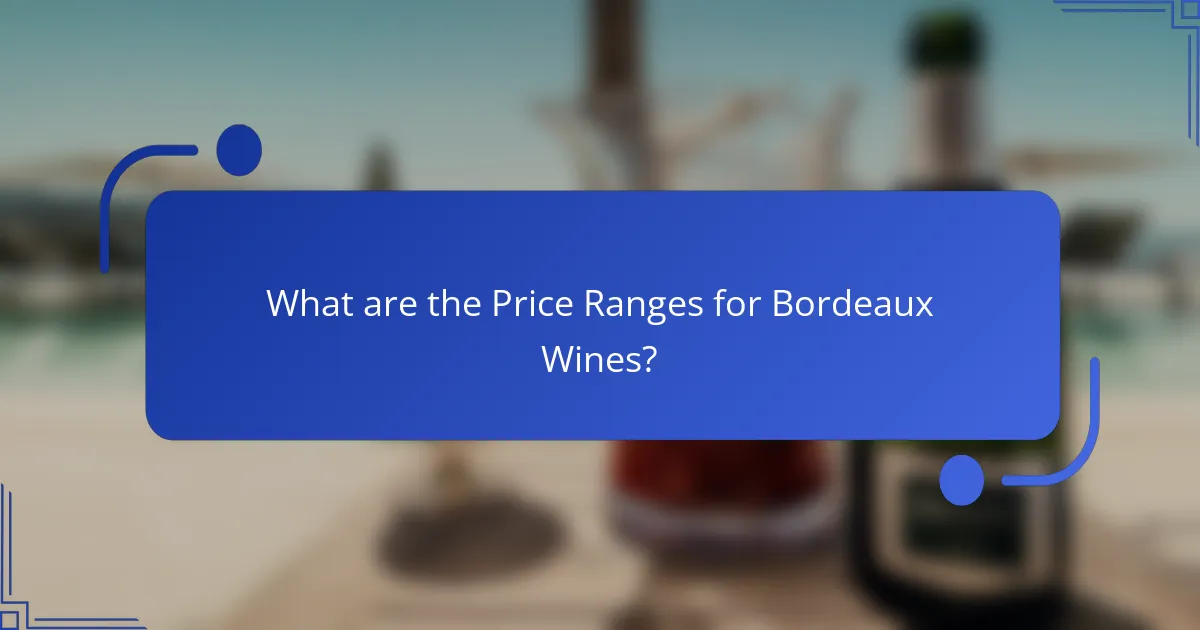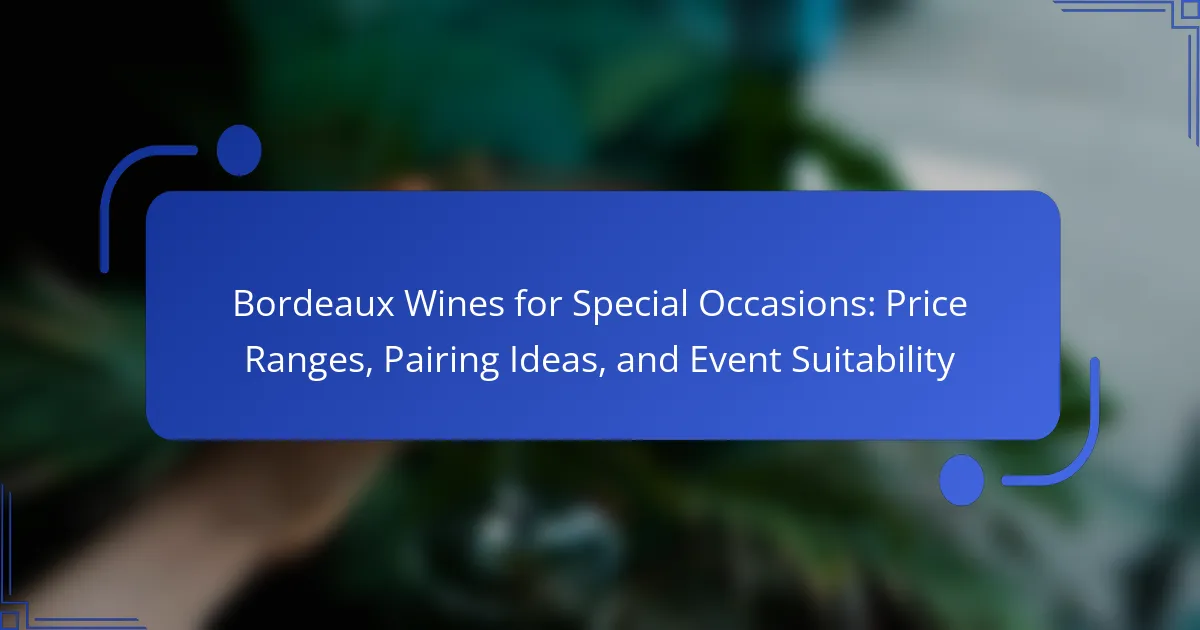
What are Bordeaux Wines and Why are They Special for Occasions?
Bordeaux wines are red, white, and sweet dessert wines produced in the Bordeaux region of France. They are renowned for their complex flavors and aromas, which stem from the region’s unique terroir and climate. Bordeaux wines often feature blends of grape varieties, including Merlot, Cabernet Sauvignon, and Cabernet Franc. Their aging potential is significant, with many wines improving for decades.
Bordeaux wines are special for occasions due to their prestigious reputation and versatility. They pair well with a variety of foods, enhancing the dining experience. The wines’ rich history and tradition add a sense of elegance to any celebration. Notably, Bordeaux wines have received numerous accolades, solidifying their status among wine enthusiasts. Their diverse price ranges also make them accessible for different occasions, from casual gatherings to formal events.
How are Bordeaux Wines classified?
Bordeaux wines are classified primarily into five categories: AOC (Appellation d’Origine Contrôlée), Grand Cru Classé, Cru Bourgeois, Bordeaux Supérieur, and Vin de France. The AOC classification ensures wines meet specific regional standards and regulations. Grand Cru Classé wines are the highest-ranking wines, established in the 1855 classification system. Cru Bourgeois wines represent quality but are not part of the Grand Cru system. Bordeaux Supérieur wines must adhere to stricter production rules than standard Bordeaux wines. Vin de France wines are the most basic classification, allowing for greater flexibility in grape sourcing and production methods. This classification system reflects the quality and characteristics of Bordeaux wines, aiding consumers in their selection.
What are the key characteristics of Bordeaux wine regions?
Bordeaux wine regions are known for their diverse terroirs and grape varieties. The region features a maritime climate, which influences grape ripening. Bordeaux is primarily divided into the Left Bank and Right Bank. The Left Bank is famous for Cabernet Sauvignon wines, while the Right Bank is known for Merlot. Bordeaux wines often exhibit rich flavors and structured tannins. The region has a long history of winemaking, dating back to Roman times. Bordeaux is home to several prestigious appellations, including Médoc and Saint-Émilion. The region produces both red and white wines, with red being the most predominant. Bordeaux wines are often aged in oak barrels, contributing to their complexity.
What grape varieties are commonly used in Bordeaux wines?
Bordeaux wines commonly use grape varieties such as Cabernet Sauvignon, Merlot, and Cabernet Franc. These varieties form the backbone of many Bordeaux blends. Cabernet Sauvignon is known for its structure and aging potential. Merlot adds softness and fruitiness to the blend. Cabernet Franc contributes aromatic complexity and finesse. Other notable varieties include Petit Verdot and Malbec, which are used in smaller quantities. Bordeaux’s terroir significantly influences the characteristics of these grapes. This diversity of grape varieties enables a wide range of wine styles in Bordeaux.
What makes Bordeaux Wines suitable for special occasions?
Bordeaux wines are suitable for special occasions due to their rich heritage and exceptional quality. They are often associated with luxury and celebration. Bordeaux wines exhibit complex flavors and aromas, enhancing the overall dining experience. The region’s prestigious vineyards produce acclaimed varieties, such as Cabernet Sauvignon and Merlot. These wines typically age well, developing deeper flavors over time. Their versatility allows them to pair well with a variety of gourmet dishes. Bordeaux wines are frequently chosen for weddings, anniversaries, and other significant events. The historical significance and reputation of Bordeaux wines further elevate their status for special occasions.
How do Bordeaux wines enhance the dining experience?
Bordeaux wines enhance the dining experience through their complex flavors and aromas. These wines offer a rich profile that complements various cuisines. Bordeaux wines typically feature notes of dark fruits, earthiness, and subtle oak. This complexity allows them to elevate the taste of dishes they are paired with. For instance, a full-bodied Bordeaux can enhance the flavors of red meats. Studies show that wine can improve food perception and enjoyment. A 2018 study by the University of Bordeaux found that wine pairing enhances the overall dining satisfaction. Bordeaux wines also provide a sense of occasion, making meals feel more special. Their prestigious reputation adds to the dining experience’s elegance and sophistication.
What cultural significance do Bordeaux wines hold during celebrations?
Bordeaux wines are culturally significant during celebrations as they symbolize luxury and sophistication. They are often chosen for weddings, anniversaries, and formal gatherings. The region of Bordeaux is renowned for its high-quality wines, which enhances their status in celebratory contexts. Historically, Bordeaux wines have been associated with nobility and fine dining since the 18th century. This long-standing tradition adds to their appeal during special occasions. Additionally, Bordeaux wines are frequently paired with gourmet meals, elevating the overall dining experience. Their diverse flavor profiles cater to various tastes, making them a versatile choice for celebrations. Thus, Bordeaux wines play a vital role in enhancing the cultural and social aspects of festivities.

What are the Price Ranges for Bordeaux Wines?
Bordeaux wines typically range from $10 to over $500 per bottle. Entry-level Bordeaux wines can be found for around $10 to $30. Mid-range options usually fall between $30 and $100. Premium Bordeaux wines, especially those from renowned châteaux, can exceed $500. For example, prestigious labels like Château Lafite Rothschild often command prices in the thousands. The price varies based on factors such as vintage, region, and producer reputation.
How do Bordeaux wine prices vary by quality and vintage?
Bordeaux wine prices vary significantly based on quality and vintage. Higher quality Bordeaux wines often command premium prices due to their superior taste and aging potential. For example, first-growth Bordeaux wines can sell for thousands of dollars per bottle. In contrast, lower-quality Bordeaux wines may be available for under $20.
Vintage plays a crucial role in pricing as well. Exceptional vintages, like 2005 or 2010, tend to be more expensive due to increased demand and limited supply. Historical auction data shows that top vintages can appreciate in value over time, sometimes doubling or tripling in price. Overall, both quality and vintage are key factors influencing the pricing of Bordeaux wines.
What factors influence the pricing of Bordeaux wines?
The pricing of Bordeaux wines is influenced by several key factors. The reputation of the winery plays a significant role in determining price. High-demand vintages from renowned châteaux often command higher prices. The quality of the vintage year also affects pricing, as exceptional years yield better wines. Terroir, or the specific environmental conditions of the vineyard, contributes to the uniqueness and value of the wine. Market trends and consumer preferences can drive prices up or down. The aging potential of Bordeaux wines impacts their long-term value. Additionally, production levels and scarcity of certain wines influence their market price. Historical auction results show that wines from prestigious estates consistently achieve higher prices, validating these factors.
What are the price ranges for different types of Bordeaux wines?
Bordeaux wines are available in a wide range of prices. Entry-level Bordeaux wines typically range from $10 to $25 per bottle. Mid-range Bordeaux wines can cost between $25 and $75. Premium Bordeaux wines, including classified growths, often range from $75 to $300. Exceptional vintages and prestigious châteaux can exceed $300, reaching prices of several thousand dollars. These price ranges reflect the quality and reputation of the wines. The variations in pricing are influenced by factors such as vintage, producer, and terroir.
Where can you find affordable Bordeaux wines for special occasions?
Affordable Bordeaux wines for special occasions can be found at local wine shops and online retailers. Many wine shops offer discounted selections during seasonal sales. Online platforms like Vivino and Wine.com provide competitive pricing and user reviews. Additionally, grocery stores often have special promotions on Bordeaux wines. Exploring local wineries may yield unique, budget-friendly options. Wine auctions can also present opportunities for finding affordable bottles. Engaging with wine clubs might offer exclusive deals on Bordeaux selections.
What are some reputable retailers for purchasing Bordeaux wines?
Reputable retailers for purchasing Bordeaux wines include Wine.com, Total Wine & More, and Vivino. These retailers offer a wide selection of Bordeaux wines from various vintages. Wine.com is known for its extensive inventory and customer reviews. Total Wine & More provides competitive pricing and knowledgeable staff. Vivino allows users to compare prices and read user-generated reviews for specific bottles. Each retailer has a strong reputation in the wine community, ensuring quality and authenticity.
How can you identify good value Bordeaux wines?
To identify good value Bordeaux wines, look for wines priced between $15 to $30. These wines often provide quality without the higher price tag. Focus on lesser-known appellations like Bordeaux Supérieur or Côtes de Bordeaux. These regions produce excellent wines that offer better value compared to famous areas like Médoc or Saint-Émilion. Additionally, check for recent vintages, as they can indicate quality. A wine rated 90 points or higher by critics is often a good indicator of value. Lastly, consider the producer’s reputation; established wineries typically offer reliable quality at reasonable prices.

What are the Best Pairing Ideas for Bordeaux Wines?
Bordeaux wines pair excellently with a variety of foods. Red Bordeaux complements red meats like beef and lamb. The tannins in these wines enhance the flavors of grilled or roasted meats. Bordeaux white wines are ideal with seafood and poultry dishes. Their acidity balances rich sauces and buttery textures. Cheese, particularly aged varieties, pairs well with both red and white Bordeaux. Dishes featuring mushrooms also harmonize with the earthy notes of Bordeaux wines. Dark chocolate desserts can be a delightful match with sweet Bordeaux wines. These pairings enhance the overall tasting experience, showcasing the wine’s complexity and depth.
What foods pair best with red Bordeaux wines?
Red Bordeaux wines pair best with rich meats and hearty dishes. Classic pairings include grilled lamb, beef stew, and duck. These foods complement the wine’s tannins and acidity. Aged cheeses like cheddar and gouda also work well. The bold flavors of these dishes enhance the wine’s complexity. Additionally, mushroom-based dishes can create a harmonious balance. The earthy notes in mushrooms align with the wine’s profile. Red Bordeaux is versatile, making it suitable for various cuisines.
How do flavor profiles of Bordeaux wines complement various dishes?
Bordeaux wines feature diverse flavor profiles that enhance various dishes. Red Bordeaux wines typically exhibit notes of dark fruits, herbs, and earthy undertones. These characteristics complement rich meats like lamb and beef. The acidity in Bordeaux wines balances the fat in these dishes, enhancing the overall taste experience. White Bordeaux wines often present citrus, floral, and mineral notes. These flavors pair well with seafood and poultry. The crispness of white Bordeaux cuts through the richness of creamy sauces. Additionally, Bordeaux wines can enhance the flavors of cheeses, particularly aged varieties. The tannins in red Bordeaux soften when paired with protein-rich foods, creating a harmonious balance. Overall, the complexity of Bordeaux wines allows for versatile pairing options across various cuisines.
What are some classic pairings with white Bordeaux wines?
Classic pairings with white Bordeaux wines include seafood, poultry, and creamy sauces. These wines complement shellfish like oysters and scallops exceptionally well. They also enhance the flavors of grilled chicken and turkey dishes. Creamy pasta dishes, particularly those with cheese or butter, pair nicely too. The acidity of white Bordeaux balances rich flavors in these foods. Additionally, goat cheese is a popular pairing, as its tanginess contrasts beautifully with the wine. These combinations are rooted in traditional culinary practices. They highlight the versatility of white Bordeaux wines in enhancing various meals.
How can Bordeaux wines be paired with desserts?
Bordeaux wines can be paired with desserts by considering their sweetness and flavor profiles. Sweet Bordeaux wines, such as Sauternes, complement rich desserts like crème brûlée or fruit tarts. The honeyed notes in Sauternes enhance the flavors of these desserts. For chocolate desserts, a full-bodied red Bordeaux can provide a contrasting richness. The tannins in the red wine balance the sweetness of chocolate. Additionally, lighter Bordeaux wines work well with fruit-based desserts, enhancing their freshness. Pairing a dry Bordeaux with sorbet can create a refreshing experience. These pairing principles are rooted in the balance of flavors and textures.
What dessert flavors work well with sweet Bordeaux wines?
Dessert flavors that work well with sweet Bordeaux wines include caramel, honey, and fruit-based flavors. These flavors complement the wine’s rich sweetness and enhance its complexity. Creamy desserts like panna cotta or cheesecake also pair excellently. Additionally, chocolate desserts, especially dark chocolate, create a harmonious balance with the wine’s sweetness. Citrus flavors, such as lemon or orange, provide a refreshing contrast. Nutty flavors, like almond or hazelnut, can also enhance the overall tasting experience. These pairings are supported by the wine’s inherent flavor profile and sweetness level.
How does the sweetness level of Bordeaux wines affect dessert pairings?
The sweetness level of Bordeaux wines significantly influences dessert pairings. Sweet Bordeaux wines, like Sauternes, complement rich desserts such as crème brûlée and fruit tarts. Their sweetness enhances the flavors of these desserts. Dry Bordeaux wines pair well with lighter desserts like sorbets and fruit salads. The contrast between the wine’s acidity and the dessert’s sweetness is crucial. A balanced pairing enhances the overall tasting experience. Sweet wines often have higher residual sugar, making them ideal for sweet treats. This principle is supported by wine pairing guidelines that emphasize matching sweetness levels.

What Events are Suitable for Serving Bordeaux Wines?
Bordeaux wines are suitable for formal events, dinner parties, and celebrations. They pair well with gourmet meals, enhancing the dining experience. Bordeaux wines are often served at weddings due to their prestige. They are also popular at corporate events, adding sophistication to the atmosphere. Additionally, Bordeaux wines complement holiday gatherings and special anniversaries. Their diverse flavor profiles make them versatile for various cuisines. Serving Bordeaux wines can elevate the overall enjoyment of the occasion.
What types of events are ideal for Bordeaux wine serving?
Bordeaux wine is ideal for formal events, such as weddings. Its complexity and elegance complement celebratory atmospheres. Bordeaux is also suitable for gourmet dinners. The wine pairs well with fine cuisine, enhancing the dining experience. Corporate events benefit from Bordeaux’s prestigious reputation. Serving Bordeaux elevates networking occasions. Additionally, Bordeaux wine is perfect for wine tastings. It showcases the region’s rich heritage and variety. Lastly, holiday gatherings often feature Bordeaux for its festive appeal.
How can Bordeaux wines enhance formal gatherings?
Bordeaux wines enhance formal gatherings by providing a sophisticated beverage option. Their rich flavors complement a variety of gourmet dishes. Bordeaux wines are known for their quality and prestige, making them a conversation starter. The region’s history of winemaking adds an element of tradition to events. Additionally, the diversity of Bordeaux wines caters to different palates, ensuring guest satisfaction. Pairing options include red Bordeaux with red meats and white Bordeaux with seafood. Serving Bordeaux wines can elevate the overall dining experience. Their presence signals attention to detail and enhances the ambiance of formal occasions.
What casual occasions benefit from serving Bordeaux wines?
Casual occasions that benefit from serving Bordeaux wines include dinner parties, picnics, and barbecues. Bordeaux wines complement a variety of foods, making them suitable for meal pairings. They enhance the dining experience with their rich flavors and aromas. Bordeaux wines are versatile, pairing well with meats, cheeses, and even vegetarian dishes. Their complexity makes them a conversation starter among guests. Additionally, Bordeaux wines can elevate the ambiance of informal gatherings. They are often appreciated by both casual wine drinkers and connoisseurs alike. This adaptability makes Bordeaux wines a popular choice for relaxed social settings.
What tips should you consider when serving Bordeaux wines at events?
Serve Bordeaux wines at the correct temperature. Red Bordeaux should be served between 60-65°F. White Bordeaux is best at 45-50°F. Use appropriate glassware to enhance the wine’s aroma and flavor. Bordeaux glasses have a wider bowl for reds and a narrower shape for whites. Decant red Bordeaux to aerate and soften tannins. This process can take 30 minutes to an hour. Pair Bordeaux wines with complementary foods. Red Bordeaux pairs well with red meats and rich cheeses. White Bordeaux complements seafood and poultry dishes. Consider the vintage when selecting wines for your event. Older vintages may require more careful handling. Provide tasting notes for guests to enhance their experience. This information can include flavor profiles and food pairing suggestions.
How should Bordeaux wines be stored before serving?
Bordeaux wines should be stored in a cool, dark place before serving. The ideal temperature for storage is between 50°F to 55°F (10°C to 13°C). Humidity levels should be maintained around 70% to prevent cork drying. Bordeaux wines should be kept horizontally to keep the cork moist. Avoid exposure to direct sunlight and vibrations, as these can affect the wine’s quality. Proper storage enhances the wine’s aging potential and preserves its flavors. Studies indicate that consistent storage conditions can improve the overall tasting experience.
What temperature is ideal for serving different types of Bordeaux wines?
Red Bordeaux wines are best served at 60-65°F (15-18°C). This temperature enhances their complex flavors and aromas. White Bordeaux wines should be served at 45-50°F (7-10°C). This cooler temperature preserves their crispness and freshness. Sweet Bordeaux wines are ideally served at 50-55°F (10-13°C). This range balances sweetness with acidity. Serving at the right temperature is crucial for optimal tasting experiences.
Bordeaux wines are prestigious wines produced in the Bordeaux region of France, known for their complex flavors and aging potential. This article provides an overview of Bordeaux wines, including their classifications, key characteristics, and the grape varieties used. It highlights the suitability of Bordeaux wines for special occasions, their diverse price ranges, and effective food pairing ideas. Additionally, it discusses the cultural significance of Bordeaux wines during celebrations and offers practical tips for serving them at various events.
